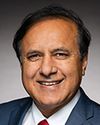Thank you, Mr. Chair.
I just want to continue with my line of thinking here. Because of some of the things that are happening in our country—you can go all the way back to things like the cost of living, the terrible inflation we have and the difficulty people are having in finding houses—we have youth in our country who sometimes don't have a lot of options for how to feed themselves, and they are vulnerable. Then, at the same time, we have laws that have been relaxed, making them less onerous, I guess. We're making it easier to commit crimes without fear of consequences. These are things that have been done by the current government.
Then, we have cartels and gangs that see an opportunity. In the case of this story, the allegation is that Mexicans are coming to Canada and then getting smuggled back into the U.S.A. Cartels are all about making money; that's their primary goal. They don't care how they do it, and they don't care whom they hurt in the process. That's not their concern. What they see here, then, is the lack of rules or the slackening of our rules. The loopholes that this government has created in our rules have created vulnerabilities in our country. The cartels are very creative when they look at how they can best make money, so they see these loopholes. They see the lessening of laws as an opportunity for them to exploit people.
We have to remember that there's no love lost for cartels here. The terrible part, the tragedy in this, is the people who get unwittingly involved in this, the youth and others who are involved in the crimes.
Oftentimes, as I've said before, it can be women and girls who are trafficked into all kinds of slavery and prostitution. It's not that they went looking for it. It's not something they even wanted, but they end up there because we allow cartels and gangs to have this power. We've neglected to put proper laws in place and proper consequences to breaking the law.
That's what we're hearing from this article, and that's why we think it's important that we hear from the minister on this and get his take. As my colleague pointed out, there are some very troubling inconsistencies in the testimony we heard from the government itself and from what was said when the minister was here with the officials versus what we're reading in this article. There are questions we need to ask. Maybe, as was said by my colleague, they were just mistakes or inadvertent things said in error. I'm not sure, but we need to find out. Were there actual reports? Is there proper documentation of this?
The article is not necessarily naming a specific cartel, but—and this is from the article—“members of organized crime groups have been identified as being involved.” This is something that's very serious. It's something we need to look at, I think, urgently at the committee. It doesn't have to take a long time, as is pointed out in this motion.
We always talk about having the minister here, but we also need officials, because we need to understand at a deeper level what's being done and get to the truth. The most important thing here is that we have a conflict between what was told to this committee and what we're reading here. I think that's something that we as committee members should be very concerned about.
Mr. Chair, you should be concerned about this as well, because we want to protect the integrity of the committee here in that we get information that allows us to understand the situation and make good decisions. When that's in question, that's not good for anybody. It's not just bad for our committee; it's bad for all committees. We need to make sure that the information we're getting here is accurate.
That's why I think that this is an important motion and an important, quick study we can do, and I give my support to my colleague in doing this.
With that, I will end.







